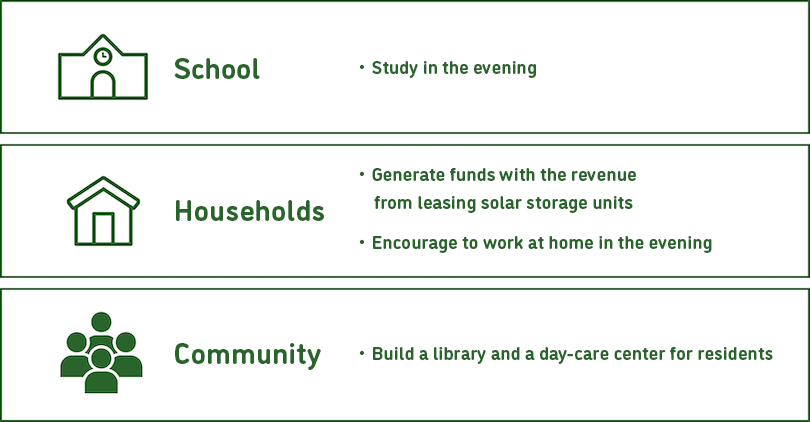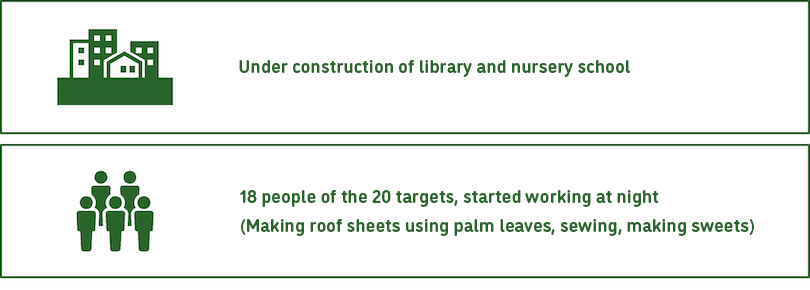Off-grid Solutions Project
 Myanmar Activity Report
Myanmar Activity Report
October,2018 - March,2022
Contribution to the improvement of education and people's lives with photovoltaic power generation and energy storage systems, and lighting
Activity Overview

Baingbin Senna Village, Ayeyawady Region
Implementation period: 2 years (April 2018 to March 2020)
|
Households : |
Approx. 400 (population: 1,845) |
|---|---|
|
Electrification : |
Although the government has been promoting electrification, the residents are unlikely to have access to electricity for another five years. |
|
Major industry : |
95% of the residents are engaged in agriculture, with two-thirds of them being landless day laborers. The farmers plant double crops consisting of rice and beans, and make money by selling dried red pepper. |
|
Economic situation : |
Average annual household income is about 100,000 yen. |

There is no light in classrooms. Electricity from a generator and a tractor engine is provided for the student dormitory.
Main activities
In 2018, one Power Supply Station* and 100 solar storage systems were donated. The Power Supply Station* was installed in the village school, and the solar storage systems are lent to households and used in school dormitories and clinics with the aim to improve living and education standards (until March 2020).
Training local citizens as human resources via developmental learning
Training people to engage in the operation, maintenance, and servicing of photovoltaic systems, and developing awareness of electricity use.
Donation of photovoltaic power generation and energy storage systems
Donating the Power Supply Station* and solar storage systems to schools, student dormitories, and places of industrial activities.
Renting 90 solar storage systems to 90 households living in the center of the village.
Helping improve education and income (economy)
Providing lighting in schools for evening classes and in student dormitories to raise the enrollment rate.
Building models for local industry using electricity, including the production and sale of ice pops and renting of solar storage systems.
* This Power supply station (Power supply container) was discontinued in March 2019. So currently we cannot supply and donate it. Thank you for your understanding.
Thaung Thone Lone Village, Ayeyarwady Region
Implementation period: 2 years (April 2020 to March 2022)
|
Households : |
Approx. 200 (Population: Approx. 800) |
|---|---|
|
Electrification : |
Most households use candles for lighting. They use one candle per day, which lasts only one hour. |
|
Major industry : |
Agriculture |
|
Economic situation : |
Average annual household income is about 100,000 yen. |
|
Education environment : |
The primary school with 180 students was promoted to a quasi-junior high school1 in 2019 (260 students). Three out of the four schoolhouses have a thatched roof and a simple frame, and the Association for Rengein Tanjoji International Cooperation supported the construction of new schoolhouses. |

Main activities
Solar storage systems are provided to all households in the village aiming to improve children's learning environment in the evening and help increase income by allowing working at home longer into the evening. In addition, a solar storage rental system was launched to use the accumulated rental fees for improving the education environment, including the construction of a school library.
Renting of photovoltaic and energy storage systems
Rent 200 solar storage systems to about 200 of the village's households.
Helping improve education environment
By using light, ensure that children have proper study time in the evening, and aim to improve their academic performance and increase their reading time.
Helping increase income (economy)
Use collected solar storage rental fees (450,000 kyats/year) for improving the education environment. Provide lighting, which helps residents work at home longer into the evening.
Partner organizations
ARTIC is engaged in relief work for domestic and international refugees and for the poor in developing countries, contributing to improving social welfare based on the concept of salvation through Mahayana Buddhism. It also fosters human resources (both Japanese and non-Japanese) inside Japan, with the aim of raising awareness for international cooperation and the environment.
Baingbin Senna Village
A farming village as the children's future
Though situated in one of the world's best rice-growing regions spreading around the lower reaches of the Ayeyarwady River, two-thirds of the people are farmers without land who work as day laborers in agriculture, with an average annual income of 100,000 yen. Although there weren’t any high school in the local area, a school was built in the center of the village in 2016 with the aid of the Association for Rengein Tanjoji International Cooperation (ARTIC).Among the six villages where schools were built in the same year, this village was the quickest to raise the necessary funds from residents, showing a significant awareness of self-support.


Achievement at school has the potential to change how people live.
Efforts are being made to increase the rate of enrollment in advanced schools of this school from the current 14% to 50%.The village's high school is aiming at a rate of 50%. In the big city of Yangon, students wishing to go to university usually go to cram schools. With no access to such schools in the village, being able to revise at night is a major help to pass the entrance exam for high school. In addition to lighting up dark classrooms to help improve children’s education, measures are being sought to utilize electricity in the village’s industries such as the production and sales of ice cream bars and the renting of solar storage systems.

* This Power supply station (Power supply container) was discontinued in March 2019. So currently we cannot supply and donate it. Thank you for your understanding.
Activity Results
Contributed to increasing the rate of children's enrollment in advanced schools by utilizing lighting and electricity.
Since April 2018, Panasonic has developed communities mainly in the Baingbin Senna Village and the Thaung Thone Lone Village of the Ayeyarwady Region with the cooperation of the Association for Rengein Tanjoji International Cooperation (ARTIC).
Toward the goal of making a social impact by achieving sustainable growth in communities, we designed activity processes mainly targeting children. In the Baingbin Senna Village, through the use of electricity supplied from photovoltaic and energy storage systems in the dormitory of the village-run school, students have now become able to study later in the evening. Our efforts yielded positive results including a contribution to increasing the rate of enrollment in advanced schools1 by about 15%. In the Thaung Thone Lone Village, through the generation of funds with the revenue from leasing solar strage units, we constructed common facilities in the village.
< Baingbin Senna Village >
Inputs
(investments)


Activities


Outputs
(activity results)



- Pass rate of the graduation exam
- Schools with fewer teachers and inadequate facilities compared to high schools
< Thaung Thone Lone Village >
Inputs
(investments)


Activities


Outputs
(activity results)



Future activities to create more social impacts
Our activities will focus on supporting the development of human resources in Myanmar. We will use a biography of Panasonic's founder Konosuke Matsushita as educational material and providing teachers in training as well as students with opportunities to learn new ways of achieving success.
![[New] Support for activities to develop human resources in Myanmar/01 Hold a book report competition by using Konosuke Matsushita's biography.02 Hold lectures on Konosuke Matsushita's life for schools supported by an NGO.03 Use Konosuke Matsushita's biography in the Myanmar teacher training school.](/content/dam/panasonic/phd-global/en/corporate/sustainability/citizenship/solution/off-grid/myanmar_report/img06.png)






Expected social impacts
Outcomes